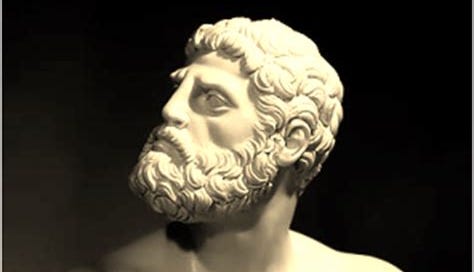Remember when they tore down all the statues?
A lesson from Ancient Greek Athletics on messing with historical forces beyond our control
A statue tried for murder?
When the people of the Ancient Greek city state of Thasos threw the statue of Theagenes, Olympic Champion in 480BCE, into the sea, they at least had the good manners to put the statue on trial for murder first.
Theagenes had a local enemy, who every night came to the statue to whip it. One night the statue fell on the man, killing him. This set in motion the strange scene where the statue was convicted of murder and thrown into the sea. The man’s sons demanded justice and the citizens were happy to play along. But their zealous fervor to enact historical retribution blinded them from the dangers of exacting justice across generations.
The Ancient Roman travel writer Pausanius recalled the story almost 2000 years ago and is how we know of this dramatic moment today:
“After he died, one of his enemies came every night to the statue of Theagenes in Thasos, and flogged the bronze image as though he were whipping Theagenes himself. The statue stopped this outrage by falling upon the man, but his sons prosecuted the statue for murder. The Thasians threw the statue into the sea…”
The Thasians began to endure years of severe drought and starvation, punishment from the gods over their hasty rebuke of a former local hero. The citizens sent work to the Oracle of Delphi, the most powerful prophet in the ancient Greek world for instructions from the gods on how to end the drought. The Oracle sent back instructions to bring back all exiled former citizens. The Thasians did this for all living exiles but still the drough persisted. Only when they rescued the statue from the sea and restored it to its place did the drought subside.
In the words of Pausanius:
“They sent to the Pythia for a second time and said that, although they had followed the instructions, the wrath of the gods still was upon them. The Pythia then responded to them: You do not remember your great Theagenes…The Thasians set the statue back up in its original position, and are no accustomed to sacrifice to Theagenes as to a god. I know of many places, both among the Greeks and among the barbarians, where statues of Theagenes have been set up. He is worshipped by the natives as a healing power.”
Modern Day Statue Removal
Contrast this story today regarding the removal of statues or the outright destruction of them by angry mobs. It seems every summer we endure another round of protests around removing a statue or renaming an old building because some people are ‘offended’ at history.
History is not sanitary and commemorating it includes dealing with uncomfortable truths about our past. That's one of the reasons we have historical monuments. But their outright destruction and removal without a broader public consultation (many of these statues are on public land) does a disservice to how we commemorate the past. If you want to sanitize history to suit present tastes, you won't have any history left.
The lesson of history is to learn what people did in the past, it's not a comment on the present, merely an attempt to discern how we got here.
That's why statues matter and why we should be very hesitatnt to take them down.
We lose our path.
Should all statues stay up in perpetuity?
No, some deserve to be taken down, but not in a fit of rage or bout cultural revolutionary zeal.
That's the lesson of Theagenes.
We must honor that which offends
Theagenes won the most athletic titles in Ancient Greek history, over 1400 individual wins. Quite a record yes!
But that also indicates a type of mercenary attitude towards athletics, competing for fame and riches, not the glory of competition and personal growth. So his statue, while representing the greatness of the city of Thasos also belies a character failing of Theagenes, despite his athletic prowess.
For the Ancient Greeks, athletics were prized as religious observances and meant to enlighten the individual athletes.
The athlete was expected to be moral and only chase the internal values associated with athletics.
Yet even when a city decided to turn its back on a champion of dubious moral worth, they were still punished decisively by the gods.
So the lesson is to be very careful about why and when you tear down a statue, because even if you believe yourself to be on the righteous side, you are tampering with historical forces beyond your understanding.








